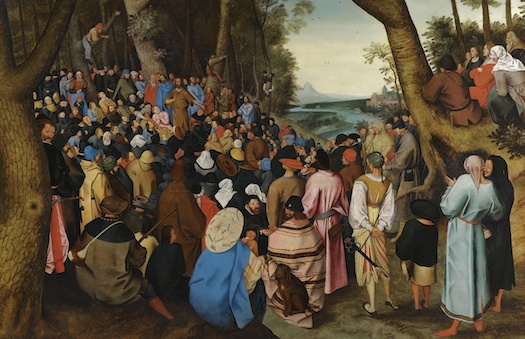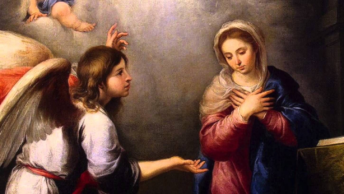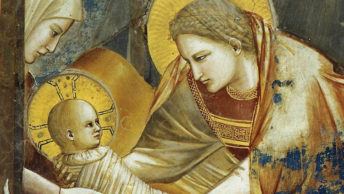
Here we are with Christmas just two and a half weeks away. The shops and malls are loaded with goodies. Christmas songs fill the air. Parties are being arranged and delicacies prepared. Thoughts of home, of family, and of a lovely time fill our hopes and imaginations.
With all of these lovely sentiments in our hearts and minds we come to church today and hear about a weird guy living in the desert, wearing scratchy and horribly smelling clothes made of camel’s hair, eating locusts, calling people a bunch of snakes while telling them that fire and brimstone will come down on them, all the while threatening them with axes that will cut them down. The gospel picture ends with John the Baptist threatening the Sadducees and Pharisees with hell.
Aren’t you glad you came to church today just before Christmas to hear all of that? Well, John the Baptist reminds us that it’s likely we all need to pay attention to a few things that perhaps we have neglected in our lives, things that revolve around the presence of Christ… or His absence.
Take for instance those with whom we live — our wives, our husbands, our children, our parents, our friends. How have we loved them? How have we failed to love them? Who have we downright neglected or not treated as we should have?
Too often we take those around us for granted. We give them little, if any, of our time, our attention, our affection. Maybe we haven’t cared for them very well at all. It seems strange that we sort of assume that they know we love them without our ever actually telling them or showing them that we do love them… dearly love them. Daily routines, concerns about our work, and our habits can cause us to pay attention to material things at the expense of giving our families and friends our real attention, care, concern, and love. Maybe this Christmastime we can actually give them more of our selves as we prepare to celebrate the love of God for us made real in Christ Jesus.
What about our parents and our grandparents who live some distance away from us? Have we neglected them too? And our friends? Are there some changes we need to make because of our neglect?
Then there are those with whom we work. Our attitudes toward them are expressed in the ways we treat them or otherwise relate to them. Attitudes are the sources of human behavior. If we want to reform the way we treat others we have to begin with our attitudes toward them. We need to hear John the Baptist’s message as it applies to us.
Then, too, we should pay some attention to the way we have neglected our own selves. Are we physically out of shape? Overweight? Do we over indulge ourselves? Do we drink too much… drink too often… or eat too much? Do we care for our selves?
What is at issue is the way we have failed to love, failed to love and respect others, and failed to love and respect our selves, selves that God gave us when He brought us into life in the first place. John the Baptist’s words ought to raise questions we should face and answer.
Finally there is the matter of Christ himself. We profess our faith in Him and our love for Him. But talk is cheap and words are easily spoken. It’s what we do that gives substance to love. Today we need to take an honest look at what we are actually doing in our daily lives that reveals our faith and love in Christ. Just how real is our relationship with Jesus Christ?
Repentance means change. And change is something we dislike. If you are driving to a destination and make a wrong turn, you can’t just say “oops” and continue on driving in a wrong direction. You have to turn around and get back on the right path. You have to make a change that makes a difference. Change has its demands, demands that go beyond mere words of regret. Advent calls us to make some changes in our routines.
Advent has more to offer us, however, than that. Advent has a Savior for us. Beyond our own efforts to recognize sin and failure in our lives, beyond our confessions and admissions that lead us to repent, Advent presents us with what we truly need – a Savior. For if we’re honest with ourselves we will admit that we cannot deal with sin, repentance, and conversion all on our own. We can’t manage our lives all by ourselves.
So I’ll leave you with the first three steps of the famous Twelve Steps found in Alcoholic Anonymous. Of the twelve, the first three are the most vital and critical. They deal with what John the Baptist is talking about. So, substituting the word sin for the word alcohol the steps are:
1 – We admitted we were powerless over sin – that our lives had become unmanageable.
2 – Came to believe in a Power greater than ourselves could restore us to sanity.
3 – Made a decision to turn our will and our lives over to the care of God as we understood Him.
The only thing in life that is constant is change. The only certitude is this: that there is life where there is change. Something that is changeless is dead.
Change is hard on us all – on you and on me alike. It’s very difficult for everyone because who or what guarantees that things will be better as a result of change? A life lived close to God is the only real guarantee we have.
The wonderful thing about Advent is that in the end we are given the certitude of God’s presence in our lives in Jesus Christ. Advent is all about our expectant faith in the God who loves us enough to send us His very best… His only Son. And if we receive Him in our hearts and souls, deep down within and not simply with good wishes and nice thoughts, then the change that we enter into will move from incertitude into the certainty of God’s abiding love deep within us to empower us to deal with our selves, and to love ourselves and those around us as He would have us.








